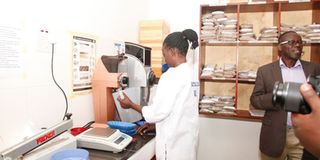Add value to agricultural commodities

A woman packages coffee after processing it in Western Uganda. You can add value to several commodities and earn a premium price. Photo by RACHEL MABALA
What you need to know:
You can increase the value of primary agricultural produce through value addition. This eventually appeals to the customer who will be willing to pay a premium price for these products, Dorothy Nakaweesi writes.
Did you know that you can cash in on agriculture without necessarily tilling the land?
According to Uganda Bureau of Statistics (Ubos), agriculture is the most important sector of the economy. The sector employs more than one-third of the work force along the value chain and there are still other opportunities of making some money.
This is possible especially if you add value to what farmers produce. This article shows how you can add value to several commodities and earn a premium price.
Ideally, value-added agriculture may also refer to increasing the economic value of a commodity through particular production processes.
These may be organic produce or regionally branded products that increase consumer appeal and willingness to pay a premium over similar but undifferentiated products.
Some of the commodities that you can add value (process) and earn a premium price include; sunflower for cooking oil, rice (sorted and packaged), millet, maize (flour and maize bran).
Others include beans (sorted and packaged), Sim Sim (paste or roasted), cassava (flour) and groundnuts (paste or roasted and packaged).
Start
Mr Charles Ocici, the executive director at Enterprise Uganda, says milling maize is one of those ventures that requires a small starting capital of under $1,000 (Shs3.5 million).
This money can set you off with locally fabricated milling machines which are widely produced in the country.
This machine can process about 300 kilogrammes of maize flour which you can then pack into two, five and 10 kilogrammes.
“The residues can then be used to produce maize bran for chicken and animals,” Mr Ocici shares.
Value addition
Mr Patrick Kisuuze, a resident of Kayunga adds value to rice through husking and packaging.
He says after getting a deal to supply rice to one of the tertiary institutions in Uganda, he went to Mbale – an area popular for rice production, where he procured 10,000 kilogrammes each at Shs1,600.
“Because the rice was not husked, I had to spend another Shs100 for each kilogramme to process and pack,” he shares.
This value addition is going to earn Kisuuze an extra Shs1,600 for each kilogramme processed because his clients will buy pay Shs3,500 for each kilogramme.
He expects to get Shs35m from his 10,000 kilogrammes having injected Shs17m as his starting capital.
“I am expecting Shs18m in profit after all expenses,” Kisuuze said.
Advice
Mr Daniel Joloba, a director in Rabboni Group Limited-an agro-processing firm, says before you start, do your research and decide on a particular commodity you want to add value to.
“Don’t start the business blindly. Establish the market needs and this will help you to work backwards to address that particular market for your value addition activities,” Mr Joloba shared.
In this research, find out the gaps. Is it volume, quality of packaging or the lack of that product on the market?
Once you have established that, get to know your suppliers of the commodity you want to add value to.
Since many Ugandan farmers don’t produce in big volumes, this affects production and supplies.
That is why you have to create a network of suppliers in that if one commodity has run out of supplies, you have other options to stock enough raw materials.
“This will help you to produce in bigger volumes and prepare you to be on the market,” Mr Joloba adds.
Adding value helps one to generate additional income that would ordinarily be lost if that product is not processed.
To achieve this, Mr Joloba advises that those who want to go into this business must actually go back on the round-table and cost.
“A typical entrepreneur must calculate what it costs them to produce, what markup they will put to be able to make a profit,” Mr Joloba cautioned.




